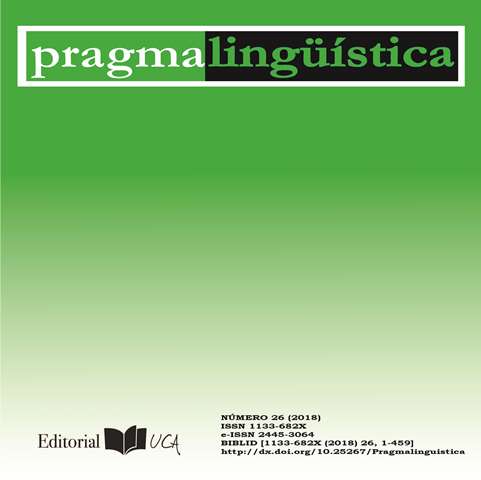Efecto de la instrucción explícita sobre la interpretación de implicaturas en aprendientes angloparlantes de español como segunda lengua

DOI
https://doi.org/10.25267/Pragmalinguistica.2018.i26.19%20Información
Resumen
Este estudio busca determinar el efecto de la instrucción explícita sobre la comprensión de implicaturas en español como segunda lengua (ESL); determinar si existe una relación entre la competencia gramatical de los aprendientes y su comprensión de implicaturas; y observar si existe un tipo de implicatura que muestre mayor dificultad en la adquisición. En la muestra participaron 23 aprendientes de ESL que fueron divididos en seis grupos (tres experimentales y tres de control) de acuerdo a su nivel de competencia en español. Los resultados no muestran respaldo estadístico, sin embargo, se observa una leve mejora entre los participantes de mayor nivel de competencia gramatical.
Palabras clave
Descargas
Cómo citar
Licencia
Derechos de autor 2018 Pragmalingüística

Esta obra está bajo una licencia internacional Creative Commons Atribución-NoComercial-CompartirIgual 4.0.
Citas
BARDOVI-HARLIG, K. (1996) Pragmatics in Language Teaching: Bringing Pragmatics and Pedagogy Together. Pragmatic and Language Learning. Monograph Series. 7(1), pp. 21-39.
BOUTON, L. (1994) Can NNS Skill in Interpreting Implicature in American English Be Improved through Explicit Instruction? A Pilot Study. Pragmatic and Language Learning. Monograph Series. 5(1), pp. 89-109.
CIGNETTI, L. M., & DI GIUSEPPE, M. S. (2015). Pragmatic awareness of conversational implicatures and the usefulness of explicit instruction. Revista Nebrija de Lingüística Aplicada, 9(0). Publicación electrónica. Disponible en: https://www.nebrija.com/revista-linguistica/files/articulosPDF/articulo_56598f3498e3f.pdf (Fecha de consulta 3/9/17).
CLENNELL, C. (1999) Promoting Pragmatic Awareness and Spoken Discourse Skills with EAP Classes. ELT Journal, 53(2), pp. 83-91.
COX, J. (2015) Explicit Instruction, Bilingualism and the Older Adult Learner. Studies in Second Language Acquisition, 2015, pp. 1-30.
ESLAMI-RASEKH, Z. (2004) Raising the Pragmatic Awareness of Language Learners. ELT Journal, 59(3), pp. 199-208.
FORDYCE, K. (2013) The Differential Effects of Explicit and Implicit Instruction on EFL Learners’ Use of Epistemic Stance. Applied Linguistics, 35(1), pp. 6-28.
GAZDAR, G. (1979). Pragmatics:Implicature, Presupposition and Logical Form. New York: Academic Press.
GRICE, H. P. (1975). Logic and Conversation, en P. Cole y J. Morgan (eds.) Syntax and Semantics, 3: Speech Acts, New York: Academic Press, pp. 41 – 58.
GRICE, H. P. (1989) Studies in the Way of Words. (3a. Ed.). Cambridge, Estados Unidos: Harvard University Press.
HORN, L. (1984). Toward a New Taxonomy for Pragmatic Inference: Q-Based and R-Based Implicature, en D. Schiffin (ed.), Meaning, Form and Use in Context: Linguistic Applications, Washington: Georgetown University Press, pp. 11 – 42.
KASPER, G., ROSE, K. (2002) Pragmatics in Language Teaching. (1a. Ed.). Cambridge, Estados Unidos: Cambridge University Press.
KASPER, G., & SCHMIDT, R. (1996). Developmental Issues in Interlanguage Pragmatics. Studies in Second Language Acquisition, 18, pp. 149–169.
KUBOTA, M. (1995) Teachability of Conversational Implicature to Japanese EFL learners. IRLT (Institute for Research in Languaje Teaching) Bulletin, 9 (1), pp. 35-67.
LEECH, G. N. (1983). Principle of Prgamatics, Londres: Longman.
LEONETTI, M. (1993) Implicaturas generalizadas y relevancia. Revista Española de Lingüística, 23(1), pp. 107-139.
LEVINSON, S. (1983). Pragmatics. Cambridge: Cambridge University Press.
LEVINSON, S. (1987). Minimization and Conversational iterference, en Verschueren, J. Y Bertuccelli-Papi, M (eds.), The Pragmatic Perspective, Amsterdam: John Benjamins, pp. 61 – 129.
MARTÍNEZ-FLOR, A. Y ALCÓN, E. (2004) Developing Pragmatic Awareness of Suggestions in the EFL Classroom: A Focus on Instructional Effects. Canadian Journal of Applied Linguistics (CJAL), 10 (1), pp. 47 – 76.
MCMANUS, K. (2017) L1 Explicit Instruction Can Improve L2 Online and Offline Performance. Studies in Second Language Acquisition, 39 (3), pp. 459 - 492.
MEDGYES, P. (1992). Native or native: Who´s worth more? ELT Journal, 46 (4), pp. 340 – 349.
PEARSON, L. (2006) Patterns of Development in Spanish L2 Pragmatic Acquisition: An Analysis of Novice Learner’s Production of Directives. The Modern Language Journal, 90 (4), pp. 473-495.
REYES, G. (2003) El abecé de la pragmática. (6a. Ed.). Madrid, España.: Arco Libros, S.L.
RIDAO, S. (2008) Análisis pragmalingüístico de resoluciones de conflictos: las mediaciones laborales. Propuestas de investigación. (1a. Ed.) Almería, España: Universidad de Almería.
ROSE, K. (1994) Pragmatic Consciousness-Raising in an EFL context. Pragmatics and Language Learning. Monograph Series. 5 (1), pp. 52-63.
SCHMIDT, R. (1990). The Role of Consciusness in Second Language Learning, Applied Linguistics, 11 (2), pp. 129 – 158.
SCHMIDT, R. (1993a). Consciousness, learning, and interlanguage pragmatics, en G. Kasper & S. Blum-Kulka (Eds.), Interlanguage pragmatics, pp. 21–42. New York: Oxford University Press.
SCHMIDT, R. W. (1993b). Awareness in second language acquisition. Annual Review of Applied Linguistics, 13, pp. 206–226.
WIDDOWSON, H. (1992). ELT and EL teachers: Matters arising, ELT Journal, 46 (4), pp. 333 – 339.
WILSON, D. Y D. Sperber (1986). Interference and Implicature, en Travis, C. (ed,), Meaning and Interpretation, Oxford: Blackwell, pp. 45 – 75. Reimpreso en Davis, S. (ed.), 1991, Pragmatic: a Reader, Oxford: Oxford University Press, pp. 377 – 392.






